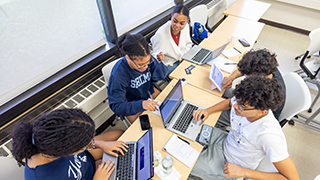Faculty Innovation Grant Awardees 2021-2022 - Seton Hall University
Wednesday, September 15, 2021
The School of Health and Medical Sciences. Proposals were rated based on a rubric which measured innovation, scalability (impact), cost, scholarship, maintenance, and currency of technology.
Faculty Innovation Grant projects are devoted to cultivating innovation through the creation or application of learning objects, resources, or innovative approaches and the infusion of technology by faculty into their courses. Awardees will present their projects at Teaching Learning and Technology Roundtable Best Practices event in the spring.
Infusion of Age-Friendly Principles into Curricula Using Interactive Modules
Sherry Greenberg, Associate Professor, College of Nursing
The goal of this project is to accelerate the Age-Friendly Health Systems (AFHS) initiative
by creating five interactive modules for undergraduate and graduate nursing students.
This content will use the 4M (What Matters, Mentation, Medication and Mobility) approach
to age-friendly care, as well as interprofessional collaboration and communication.
These modules will be embedded within in-person and online courses as assignments
and will facilitate increased interprofessional collaboration at Seton Hall University.
Video Research Essay for Digital Media
Ruth Tsuria, Assistant Professor, College of Communication and the Arts
The Video Research Essay project focuses on the creation of a video-essay assignment
for the COBF 2252 Digital Media course. The creation of this assignment offers a novel
approach and alternative to a more traditional seminar-style research paper. The project
aims to replace the traditional academic paper and allow the students to think both
academically and creatively. Video essays require innovative thinking from both the
instructor and the students. The utilization of this project requires research, analysis,
script writing, editing, and narration skills. Using a video-essay in lieu of a research
paper requires students to apply digital media logic and skills learned throughout
the course.
Visualizing Augmented Reality Interfaces in Web Design
Christine Lhowe, Assistant Professor, College of Communication and the Arts
Augmented Reality allows designers to enhance reality by combining real life scenarios
with computer-generated imagery. In ADIM 2316: Web Design II, advanced web design
students will learn the fundamentals of Augmented Reality and how it applies to the
web design field. Through the combination of Adobe XD for interface design and Adobe
Aero for Augmented Reality, they will produce a large-scale web design project that
features an AR component. Students will use multiple screens for testing and implementation
including laptop, iPads, and mobile devices. The project intention is to explore the
infusion of AR within the design professional’s knowledgebase.
Development of Online Training Module for Instrumentation in the Chemistry and Biochemistry
Teaching Laboratories
Cosimo Antonacci, Assistant Professor, Department of Chemistry and Biochemistry
The Department of Chemistry and Biochemistry employs several scientific instruments
in the teaching labs that require user training to be able to engage them safely and
effectively. Given the large number of users, and the potential for COVID to complicate
hands-on training, there is a significant need to develop online training modules
for each instrument. The purpose of this project then, is to develop a basic training
for a series of instruments used in the department of chemistry and biochemistry.
This training will serve a broad spectrum of users and will be easily accessible
online via a Blackboard Organization. Each training module will contain an on-line
video or series of videos for each of 10-15 instruments, and a brief online assessment
associated with each video to confirm that training goals were met. The benefits
of this proposal include: increased and safer usage of the instruments, less damage
to instrumentation and justification for future instrumentation grants.
Building transparent supply chain maps using a layered approach
Penina Orenstein, Associate Professor, Stillman School of Business
The goal of this project then, is to help students gain an understanding of what a
supply chain network looks like, by manipulating a set of tools (to be created as
part of this proposal) and applying them to data (Bloomberg) that is readily available.
The first stage of this project is to develop a tool that students can use to manipulate
the data to develop graphical images of the tiered network of their choice. The second
stage of the project is to take these images and transform them into a data dashboard,
to provide “at-a-glance" views of key performance indicators (KPIs) relevant to a
particular objective or business process. This project will be useful to our students
as a learning exercise and will also provide valuable information to members of the
business community.
Categories: Science and Technology






